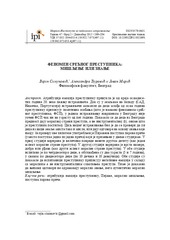Prikaz osnovnih podataka o dokumentu
The happy victimizer phenomenon: Thinking or knowledge
| dc.creator | Simunović, Vojin | |
| dc.creator | Đurović, Aleksandra | |
| dc.creator | Mirić, Jovan | |
| dc.date.accessioned | 2021-10-12T12:13:19Z | |
| dc.date.available | 2021-10-12T12:13:19Z | |
| dc.date.issued | 2015 | |
| dc.identifier.issn | 0579-6431 | |
| dc.identifier.uri | http://reff.f.bg.ac.rs/handle/123456789/2064 | |
| dc.description.abstract | The attribution of emotions to transgressors has received considerable attention of researchers since the end of the1980s. A common research finding in the Western countries (the USA, Germany, and Portugal) is that children younger than 8 years attribute positive emotions to transgressors (which is called “the happy victimizer phenomenon”, HVP). On the other hand, a research study conducted in Belgrade, Serbia, did not find the HVP even among 5-year-old children. It was established that children from Belgrade focused more on the moral side of the transgression than on the instrumental side (i.e. the things that the transgressor achieved by the transgression). The goal of our research was to evaluate whether Serbian children actually reason in this way or simply repeat what they have learned. In order to verify this hypothesis, Piaget’s method of “a pair of stories” (instead of presenting the stories one by one) was used in two studies. In the first study, the degree of injury inflicted to the other child was varied (as one aspect of the moral side of the transgression). In the second study, the type of intention (good or bad) was varied (as another aspect of the moral side of the transgression). In both studies, the sample consisted of 40 children, with two age groups (5- and 7-year-old children) that included 20 children each (10 boys and 10 girls). The conclusion of both studies was that subjects attributed negative emotions to transgressors in accordance with the moral instead of instrumental understanding of the transgression. These findings imply that children’s responses do not represent moral knowledge, but reflect authentic moral reasoning. | en |
| dc.publisher | Institut za pedagoška istraživanja, Beograd | |
| dc.rights | openAccess | |
| dc.rights.uri | https://creativecommons.org/licenses/by-nc-nd/4.0/ | |
| dc.source | Zbornik Instituta za pedagoška istraživanja | |
| dc.title | The happy victimizer phenomenon: Thinking or knowledge | en |
| dc.type | article | |
| dc.rights.license | BY-NC-ND | |
| dc.citation.epage | 284 | |
| dc.citation.issue | 2 | |
| dc.citation.other | 47(2): 269-284 | |
| dc.citation.rank | M24 | |
| dc.citation.spage | 269 | |
| dc.citation.volume | 47 | |
| dc.identifier.doi | 10.2298/ZIPI1502269S | |
| dc.identifier.fulltext | http://reff.f.bg.ac.rs/bitstream/id/860/2061.pdf | |
| dc.identifier.scopus | 2-s2.0-84957567799 | |
| dc.type.version | publishedVersion |

